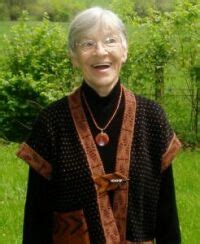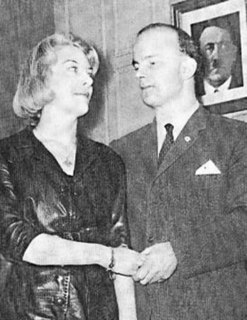A Quote by Aldous Huxley
Man's life on earth has only one end and purpose: to identify himself with his eternal Self and so to come to unitive knowledge of the Divine Ground.
Related Quotes
Christianity is sustained by the knowledge that the object of man's life on earth is his development as an eternal being. Therefore, none of his expressions of life can be an end in itself, but must serve a higher purpose than the earthly life and happiness of the individual - or even than that of the race.
The assumption that the egoless condition, or union of self and God, is man's final goal and ultimate destiny is a great mistake. My purpose here is to affirm that the unitive state is a hidden path in itself, a movement in its own right that ultimately leads to no-self (no true-self and no-union). In short, the unitive state is the hidden path to no-self.
To the exponents of the Perennial Philosophy, the question whether Progress is inevitable or even real is not a matter of primary importance. For them, the important thing is that individual men and women should come to the unitive knowledge of the divine Ground, and what interests them in regard to the social environment is not its progressiveness or non-progressiveness (whatever those terms may mean), but the degree to which it helps or hinders individuals in the their advance towards man's final end.
Man—every man—is an end in himself, not a means to the ends of others; he must live for his own sake, neither sacrificing himself to others nor sacrificing others to himself; he must work for his rational self-interest, with the achievement of his own happiness as the highest moral purpose of his life.
Life, as a part, is interwoven with the life of the whole, not only present, but past and future, for while men come and go the folk lives on, continuous, eternal, providing its members perform their duty to it. Thus, in identifying himself with his folk man prolongs himself through the multiplicity of his ancestors and his descendants, and thereby attains immortality.
The primordial model of the family is to be sought in God himself, in the Trinitarian mystery of his life. The divine "We" is the eternal pattern of the human "we", especially of that "we" formed by the man and the woman created in the divine image and likeness... Man is created "from the very beginning" as male and female: the life of all humanity - whether of small communities or of society as a whole - is marked by this primordial duality.
Only when there is a wilderness can man harmonize his inner being with the wavelengths of the earth. When the earth, its products, its creatures, become his concern, man is caught up in a cause greater than his own life and more meaningful. Only when man loses himself in an endeavor of that magnitude does he walk and live with humanity and reverence.
There must be only three supreme values which govern a person's life: Reason, Purpose, and Self-esteem. Reason, as his only tool of knowledge--Purpose, as his choice of the happiness which that tool must proceed to achieve--Self-esteem, as his inviolate certainty that his mind is competent to think and his person is worthy of happiness, which means: is worthy of living. These three values imply and require all of man's virtues, and all his virtues pertain to the relation of existence and consciousness: rationality, independence, integrity, honesty, justice, productiveness, pride.
"Our kingdom go" is the necessary and unavoidable corollary of 'Thy kingdom come.' For the more there is self, the less there is of God. The divine eternal fulness of life can be gained only by those who have deliberately lost the partial, separative life of craving and self-interest, of egocentric thinking, feeling, wishing, and acting.
Spirituality is much wider than any particular religion, and in the larger ideas of it that are now coming on us even the greatest religion becomes no more than a broad sect or branch of the one universal religion, by which we shall understand in the future man's seeking for the eternal, the divine, the greater self, the source of unity and his attempt to arrive at some equation, some increasing approximation of the values of human life with the eternal and the divine values.

































